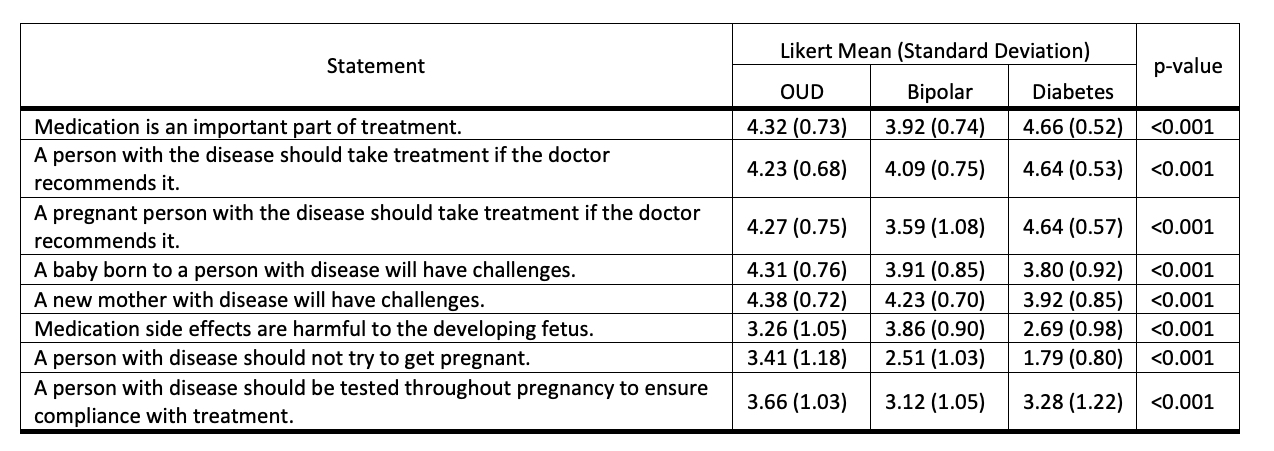Health Equity/Social Determinants of Health
Session: Health Equity/Social Determinants of Health 8
312 - Comparative perceptions of healthcare workers toward pregnant people with opioid use disorder
Sunday, May 5, 2024
3:30 PM - 6:00 PM ET
Poster Number: 312
Publication Number: 312.2191
Publication Number: 312.2191

Margaret B. Cornwall (she/her/hers)
Second Year Medical Student
USF Health Morsani College of Medicine
Tampa, Florida, United States
Presenting Author(s)
Background: Negative perception from healthcare workers toward disease states and treatment can affect patient experience and health outcomes. Pregnant people with opioid use disorder (OUD) are particularly vulnerable to stigma and this can affect the relationship of providers, including pediatricians, in caring for infants with opioid exposure.
Objective: We aimed to examine how negative perceptions differ toward distinct disease states in pregnancy (diabetes, bipolar disorder, and opioid use disorder) among various roles in the healthcare system.
Design/Methods: This is a cross-sectional analysis of survey responses from healthcare workers at a single tertiary delivery hospital. Guided by existing surveys in the literature, we assessed attitudes toward three medical conditions and corresponding treatment in pregnancy: OUD, bipolar disorder, and type 1 diabetes. Responses were measured using five Likert scale items of agreement (“strongly disagree”=1 to “strongly agree”=5). Surveys were administered to medical providers (attending physicians, residents/fellows, mid-level providers), nurses, and clinical support staff in the departments of pediatrics and obstetrics. Mean survey responses were compared using ANOVA. A p-value of < 0.05 was considered significant. SPSS was used for statistical analysis.
Results: A total of 264 healthcare workers completed the survey. Among all participants, there was a significant difference in Likert means for all questions by respondent group and by disease state (Table 1). Respondents were more likely to agree that a baby born to a person with OUD will have challenges (mean=4.31) compared to a baby born to a person with bipolar (3.91) and diabetes (3.80), p< 0.001. Overall, respondents agreed that people with OUD should not try to get pregnant (3.41, “agree”=4) compared to those with bipolar disorder (2.51) and diabetes (1.79), p< 0.001. Medical providers tended to disagree with this statement (2.51) compared to nurses (3.63) and clinical support staff (3.76), p< 0.001.
Conclusion(s): Healthcare workers have different perceptions of disease states in pregnancy, which may affect delivery of care. In general, healthcare workers have more favorable perceptions toward people with organic conditions like diabetes compared to those with behavioral conditions such as bipolar or OUD.

